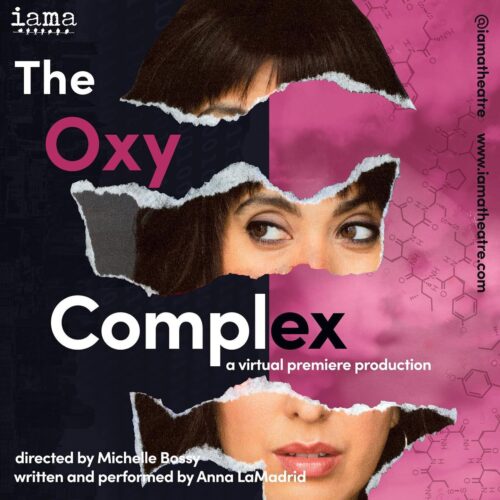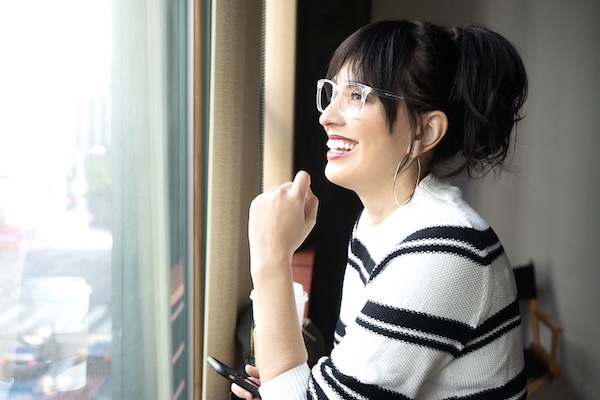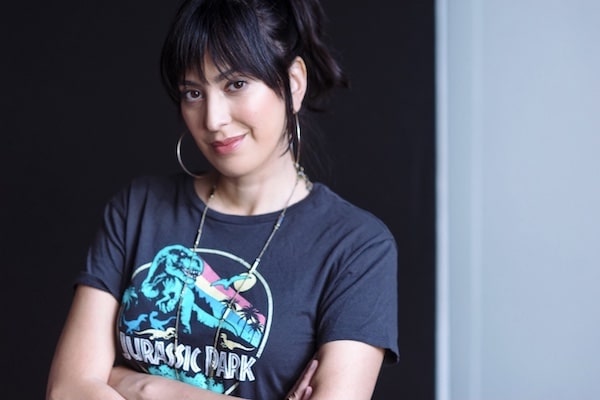After viewing “Venezuelan born, East Coast-bred” performer ANNA LaMADRID’s (Bless This Mess, Grey’s Anatomy) dark comedy and virtual premiere production presented by IAMA Theatre Company, I couldn’t help but immediately think of that line “Love is the drug, got a hook in me” from that Roxy Music classic. In this case, the internal drug of choice is oxytocin, commonly referred to as the “love” or “cuddle” hormone, which unleashes a cascade of physiological and psychological effects through the human bonding experience. I believe that would be “the hook” we were referring to, or, you could say, “the hook,” line, and sink-HER for the protagonist of THE OXY COMPLEX.
LaMadrid’s virtual production takes place during the 500th day of quarantine and explores all those very human conditions affected by that now very familiar state of mandatory isolation, including love, sex, loneliness, trauma, and that quite “complex” chemical messenger/obligate third wheel. We had the opportunity to talk to LaMadrid about her multi-faceted production which is equally funny, dramatic, and compelling. LaMadrid talks about who this play was written for, the challenge of making serious subject matter funny, and her role as therapist and teacher in this enthralling one-woman play. The Oxy Complex will run online until April 25th (ticket information below). Happy reading and, may you all get to hug that special someone once again!

COMEDY CAKE: We understand the main character Viviana is fictional, but that the show is also rooted in personal truth. How much of the work did you draw from other women around you and from your own experiences?
ANNA LaMADRID: All of it. Dating in a city like NY is incredibly daunting. So I definitely had a support system of women. We would all help each other decode text messages, exchange tips, gauge if a guy was interested, give a shoulder to cry on, etc. We talked about our collective confusion, frustration, and disappointments. We also shared a bunch of funny stories of dates gone wrong. So it’s a blend of all of that. Our stories are all universal after a while.
CAKE: How much research on human hormones did you have to do for this play? It seems like you might be qualified to become a therapist after this experience.
ANNA: LOL! Yes. I mean…I’ve always been a “therapist” to my friends. I definitely did a deep dive of research for this play. However, some of the studies were really dense — so I definitely can’t claim that I completely understand the complexity of the issue when it comes to Oxytocin and how it affects our collective ability to establish committed relationships. It was also interesting to see how the science community hasn’t take into account gender non-conforming and/or trans folks in their studies–as I was unable to find any data for that set. So, the studies are just that–theories that we are waiting for someone else’s research to disprove. I used the studies and tried to tie them into my own experience and behavioral patterns. With the Dr. Oye Me character, I was really careful to make sure that although she speaks with authority, she is a “love enthusiast” and probably flawed in her own ways with her experience with love. The line between what she says based on “research” and her own opinions is definitely blurred.
CAKE: If you had the opportunity to see a play like this before plunging into the world of relationships as a bright-eyed youth, do you think your younger self would have appreciated the lessons the play bestows?
ANNA: 1000% I wrote this play for women like myself who all throughout my 20s and early 30s carried a lot of pain, shame, and guilt around my relationship status. Questions of being worthy and/or loveable and not really understanding ALL of the factors at play. For example, understanding how our attachment styles as children affect our ability to stay in committed relationships was a huge lesson for me. I also carried this myth that if we matched on an app, that meant that person was a viable match for me. I would get really hurt if they didn’t reciprocate interest or it fizzled things out. I wasted so many years questioning all of the wrong things. If this play can do anything, I hope that it frees people to just enjoy their lives first and focus on creating a life that you might want to share with someone — but most importantly that makes you feel whole and good about who you are.
CAKE: There are some powerful moments when you bring up Viviana’s family dynamics forever affecting her future relationships. How has your own upbringing shaped your adult relations?
ANNA: That part is very close to who I am and my own struggles. I’m definitely an anxious/avoidant type. Forever looking to be loved and then doing my best to sabotage and/or flee a committed relationship for fear of being abandoned. I know that about myself now. I’m able to articulate that with the person that I’m dating. I’m able to try and pause when I get triggered and ask if this reaction is historical or the present moment. It will never go away, but instead of being in the storm and letting it take over… I feel better equipped to make sure I stay the captain of the ship–if you will.
CAKE: How challenging was it to bring humor to some dark subject matter?
ANNA: It wasn’t challenging for me. That’s the type of art I gravitate towards. I tend to think of comedy/humor as not too different from drama. Our lives are constantly filled with both aspects. I love humor because it gets you to a place where you are more open. It brings your guard down. I love those moments where you are laughing and then a piece of art shifts and gets REAL. It pierces through to your heart and you feel gutted. Then the humor comes back to lift you from that place–but you feel transformed somehow. That’s what I try to do with this show.

CAKE: We loved “The Oxy Complex’s” description of the five drunken phases of Viviana’s downward spiral, as her online dating doesn’t go quite quite as planned. Did you also base these on research or general observations?
ANNA: Observations or real-life experience? You decide. Kidding. I worked as a cocktail waitress for about 5 years in NY–so I observed plenty of drunk phases in my day. I didn’t do any research for that but felt comfortable enough in blending together different phases that I’ve seen many women (including myself) go through. Maybe it doesn’t happen all in one night— as it did for Viviana–but we’ve all been there at one point or another. I wrote it all as happening in one night because I really wanted for that moment to be the “bottom” for Viviana. The interesting thing was that her moment of epiphany didn’t happen that night. It took a global pandemic and her finally being with her thoughts and re-examining her past to see herself as worthy and begin to let go of all the baggage she’s been carrying.
CAKE: The play is set during the 500th day of quarantine for Viviana. How do you think the generation dating during this pandemic has coped with the lack of human contact, and what do you think that population will learn about this experience down the line?
ANNA: I listened to a This American Life episode that was talking about dating during the pandemic. How some people were rushing into relationships because they didn’t want to quarantine alone and how others (who previously might have been more interested in hooking up) were re-evaluating and looking to take relationships more seriously after this. So who really knows what we can expect. I can tell you what my hope is. My hope is that we start to appreciate what being present with someone else really means and how it adds to our well-being. That we put down our devices. That we start investing in relationships vs. making people feel disposable. And maybe get off these apps and go back to meeting people in real life.
CAKE: Amen to that! You bring up the term “skin hunger” during the play, which I didn’t even know was a thing. The play really nails that feeling of touch starvation. What do you think it’s going to be like once people get to reconnect with other humans again post-COVID?
ANNA: A hug fest! I’m all about cuddling and giving hugs. I mean–maybe it’s because I’m Latina and that’s part of our culture–but that’s the thing I have missed the most. So everybody…watch out! Cause when I see you…Imma be a hugging machine.
CAKE: Viviana’s mom plays a large role in shaping her daughter’s view of love, sex, and men. What do you think are the most valuable nuggets of wisdom Viviana absorbs from her mom during the play?
ANNA: Oh, man. I’m so glad you asked this question. During rehearsals, I struggled so much because I felt like I was either poking fun or making the mother character the villain on the page. And then, I was in the middle of rehearsing the Christmas scene and I felt a seismic shift in how I had crafted and been seeing the story. When I wrote it, I felt like this was the moment where it all broke for Viviana. Where she becomes the victim. But sometimes the wound also contains the salve. And I realized that at that moment, the mother character was also modeling to Viviana how to chose herself. Mama Rosa could have stayed in an unhealthy relationship for the sake of the family, but instead, she chose herself so that she could show up as a better person to her kids. I don’t know that Viviana realizes that until the end of the play when she finally chooses herself. This show is a love letter to my mom.
CAKE: What do you think are some of the biggest self-sabotaging behaviors women exhibit when trying to find the “right” companion?
ANNA: I will speak for my previous self-sabotaging behaviors and then people can decide if they have also done the same. 1) Being so unhappy with myself that I made the other person responsible for my happiness 2) Being so scared to invest in myself and my career that I took all my energy into making my partner’s goals take off and then be disappointed/resentful when they didn’t rise to the occasion. 3) Putting pressure on the partnership to save me (either financially or emotionally) 4) Compromising my boundaries and my well-being in order to be liked. 5) Not realizing that we end up picking partners that mirror our parental relationship as children. So I was constantly attracted to people who I had to work to get approval or attention from (emotionally unavailable) just because that’s all I knew and it felt familiar. 6) Thinking that love happens like romantic comedies. Spoiler alert: it doesn’t. The real work begins once the movie ends.
CAKE: What have been some of your greatest thrills bringing this production to fruition?
ANNA: Feeling like I found a collaborator for life with my director, Michelle Bossy. She’s so incredibly supportive and smart. I trust her to bring the best out of me and my work and that kind of trust allows me to let go in my process. Getting to see something that existed in my head come to life so beautifully. And finally, receiving messages from friends and colleagues about how much the show resonated with them. Made them feel less alone and/or opened a pathway towards healing. That’s the most thrilling of all.
Mentions: Tickets to see week 4 of the virtual premiere production of “The Oxy Complex” HERE. (Once you have started watching you will have 48 hours to complete watching.) You can follow Anna on Twitter & Instagram. Feature image by Jackson Davis.
